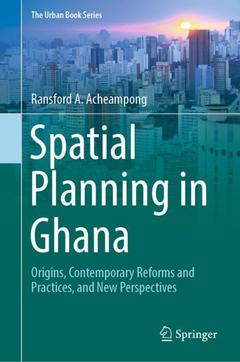Spatial Planning in Ghana, 1st ed. 2019 Origins, Contemporary Reforms and Practices, and New Perspectives The Urban Book Series

This book documents and analyses spatial planning in Ghana, providing a comprehensive and critical discussion of the evolving institutional and legal arrangements that have shaped and defined Ghana?s spatial planning system for more than seven decades; the contemporary policy instruments and mechanisms for articulating and implementing policies and proposals at multiple scales; and the formally established procedures for development management. It covers important themes in contemporary spatial planning discourse, including the evolving meaning, scope and purpose of spatial planning globally; the scales of spatial planning (i.e. national, regional, sub-regional and local); multi-level integration within spatial planning; public participation; the interface between urbanization, sustainable growth management and spatial planning; spatial planning and housing development; integrated spatial development and transportation planning; and spatial planning and the urban informal economy. Intended for undergraduate and graduate students, and academic researchers and practitioners/policy-makers in the multidisciplinary field of spatial planning, it appeals to readers seeking an international perspective on spatial planning systems and practices.
Focuses on the relevant contemporary discourse at the global scale before examining issues that pertain specifically to Ghana
Offers international as well as the context-specific perspectives
Systematically unpacks and highlights the theory-practice gap in spatial planning by emphasizing how normative planning theory shapes statutory regulations professional practices and outcomes
Provides fresh insights into the ways in which key challenges in the spatial planning system and the associated practices could be addressed
Includes examples of plans and frameworks to illustrate how various spatial planning concepts and principles are translated into policy instruments for implementation
Date de parution : 12-2018
Ouvrage de 302 p.
15.5x23.5 cm
Disponible chez l'éditeur (délai d'approvisionnement : 15 jours).
Prix indicatif 105,49 €
Ajouter au panierThèmes de Spatial Planning in Ghana :
Mots-clés :
Spatial Planning; Spatial Planning in Ghana; Public Policy; Spatial Governance; Urban Sustainability; Planning Systems; Urban Growth Management; Urban Transportation; Planning and Climate Change; Urban Housing in Ghana; Public Engagement in Planning; Policy Integration; Local Level Planning; Spatial Planning history in Ghana; landscape/regional and urban planning



